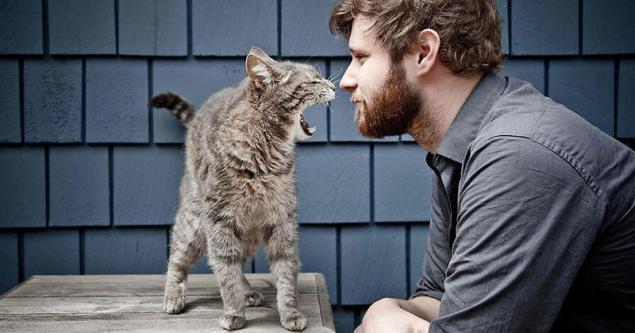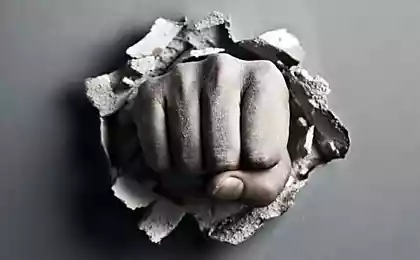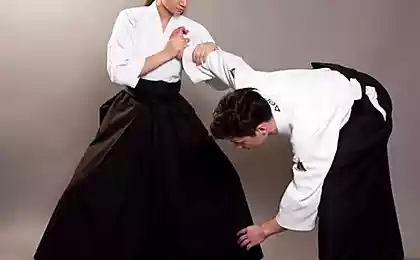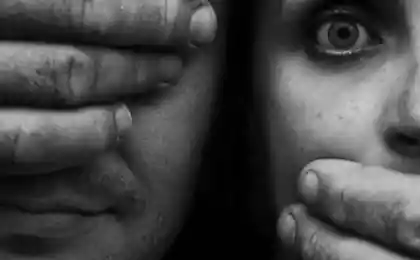404
How to Resist Alien Aggression
Sometimes I want to approach a person.
And say, "Take the aggression off your face, people around you..."
As they say, you cannot live in society and be free from society. We are all social people who meet a lot of other people every day. And we all have to deal with this mass of other people every day. And, preferably, such an interaction, after which you do not feel “squeezed lemon”. One of the common problems of such interaction is the aggression of others.
No one is immune from this, so everyone periodically has to ask the question, how to resist someone else’s aggression? How to avoid it or how to protect yourself from it?

What should be the position inside, so that people do not just think (even the most notorious "hamam") to cling to you and behave aggressively towards you?
Or, to ask the question differently, how do people who rarely encounter aggression from strangers differ from people who constantly experience it on themselves?
I’m not talking about those moments when you are carelessly hurt in line or on the subway, when a cashier who is tired of the day allows herself to talk to you in an irritated tone, or a person causes aggression by accidentally stepping on her leg.
I am talking about those moments when people purposefully, with full awareness and understanding of what they are doing, behave aggressively towards other people, specifically “hamat”, speak out, push, in general, provoke a person to respond.
Let me just say that Never, under any circumstances, aggression does not appear “just like that” out of the blue, there is always a reason for its appearance.. Just often this reason is not visible to the naked eye, and a person may not realize that he himself is the provocateur of foreign aggression.
In what form can someone else's aggression occur:
1. In the open. Everything is clear here, these are attacks from absolutely strangers, “brutishness” in transport and on the streets, “bullydozers” from the Soviet past, a neighbor is an aggressive drunkard, various kinds of people from the lower social stratum, people who are used to solving their problems in an aggressive manner.
2. In disguise.Aggression is often allowed by friends and friends on the basis of friendship. All this is expressed in unpleasant statements, advice that was not asked for, in various kinds of “bear services”. This is often not recognized by the aggressor. He is confident that he is “helping” his friend. All sorts of remarks, statements, criticism, just clinging to a person, seasoned with a sauce “I know better how to live and what to do”, and aimed at making a person comfortable with such a “friend”, and doing what he wants. It is also possible to include people who consider the rest of the “bad” not worth attention. Such people always and everywhere behave like “kings”, do not take into account other people’s opinions, but they do it not in an open form, but show all their behavior. They just have an unreasonably high sense of self-importance.
In both cases, a person who has been subjected to someone else’s aggression feels “drenched,” feels guilty for not being able to defend himself, feels humiliated, insulted, “unsettled.”
Who are these people who are constantly under the influence of foreign aggression? Or maybe not constantly, but periodically, which complicates their lives.
First, these are people who have a lot of aggression inside themselves, but who have prohibitions on its manifestation. A person realizes this aggression through the release of aggression from other people.
There is an analogy with people who are afraid of dogs. The dog senses this subconscious fear and bites or barks just such a person. In the case of foreign aggression, the same thing happens. The energetic, internal state of a person is such that he attracts aggressors into his life. Surrounding people feel, unmistakably distinguish someone who can be “bashed”, by body position, voice, facial expressions, appearance, manner of behavior and so on.
In this way, life gives feedback. People only get what is in themselves, but what they are afraid to admit, or what are internal, very strong prohibitions.
For example, a child grew up in an intelligent family, where it was impossible not to show discontent, to look “wrongly”. And the educational process was aimed at suppressing the personality, all manifestations of discontent, up to the prohibition of staying in a bad mood. This is just one example.
Or families with alcoholic fathers, when children are afraid of angering their father under the threat of physical violence. Imagine a child growing up under constant physical pressures and moral humiliation. Such a child, due to his physical weakness in front of an older person, is simply forced to suppress aggression inside.
Or a child grew up in a family where all problems were solved by shouting, swearing, swearing. And even in adulthood, such a person experiences panic fear, panic, lost before talking in high tones or rudeness. Up to various phobias.
There are many examples, but one thing unites such people.
These people are victims.

The aggressor needs to “merge” aggression, this is obvious, but only on the one who will not be able to respond. A victim whose aggression is suppressed. And since the aggressor within is himself a Victim (the same repressed), he “senses” the same Victim in another person. And even if the Victim begins to gnaw, then she will do it from the state of the Victim. And this will not lead to any positive result.
Secondly, people who attract aggressors suffer, most often, the so-called “trauma of the rejected”.
These are people who seem “too big” in the world, who try to occupy as little space as possible, who are afraid to appear inconvenient or interfere. They simply do not allow themselves too much psychologically, for example, a high salary, a more convenient and comfortable place to work, a large house or a car.
Liz Bourbo tells about this trauma in her book. I'll give you an excerpt:
“To be rejected is a very profound trauma; the rejected feels it as a rejection of his very essence, as a denial of his right to exist. Of all the five traumas, the feeling of rejection is the first, which means that the cause of such trauma in the life of the individual occurs before the others.
A good example is an unwanted child born “by accident.” A striking case is a child of the wrong sex. There are many reasons why a parent rejects their child. Very often it happens that the parent does not intend to reject the child, however, the child feels rejected on every, even small occasion - after an offensive remark, or when one of the parents experiences anger, impatience, etc. If the wound is not healed, it is very easy to unravel. A person who feels rejected is biased. He interprets all events through the filters of his trauma, and the feeling that he is rejected is only exacerbated.
From the very day the baby feels rejected, it begins to develop a fugitive mask. This mask manifests physically as an elusive physique, that is, a body (or body part) that seems to want to disappear. Narrow, compressed, it seems to be specially designed so that it is easier to escape, occupy less space, not be visible among others.
This body does not want to take up much space, it assumes the image of running away, escaping and all its life tends to occupy as little space as possible. When you see a person who looks like a disembodied ghost – “skin and bones” – you can expect with a high degree of certainty that he is suffering from a deep trauma of the rejected creature.
A fugitive is a person who doubts his right to exist; it even seems that he is not fully embodied. Therefore, her body gives the impression of incomplete, incomplete, consisting of poorly arranged fragments. The left side of the face, for example, can significantly differ from the right, and this is visible to the naked eye, there is no need to check with a ruler. When I speak of an “uncompleted” body, I mean those parts of the body where whole pieces seem to be missing (buttocks, chest, chin, ankles are much smaller than calves, depressions in the back, chest, abdomen, etc.),
Not to be present so as not to suffer.
The first reaction of a human being who feels rejected is to run away, to slip away, to disappear. A child who feels rejected and creates a fugitive mask usually lives in an imaginary world. For this reason, he is often smart, reasonable, quiet and does not cause problems.
Alone, he enjoys his imaginary world and builds castles in the air. Such children invent many ways to run away from home; one of them is the expressed desire to go to school.
The fugitive prefers not to be attached to material things, because they can prevent him from running away when and where he wants. It seems as if he is really looking down on everything material. He asks himself what he is doing on this planet; he finds it very hard to believe that he can be happy here.
The fugitive does not believe in his worth, he puts himself in nothing.
The fugitive seeks loneliness, solitude, because he is afraid of the attention of others - he does not know how to behave, it seems to him that his existence is too noticeable. And in the family, and in any group of people he stews. He believes that he must endure the most unpleasant situations to the end, as if he had no right to fight back; in any case, he sees no options for salvation. The deeper the trauma of the rejected, the more he attracts to himself the circumstances in which he is rejected or rejects himself.”
And when a person with the “trauma of the rejected” goes outside, he often becomes the object of aggression of others. Again, such a person is in the state of the Victim, and people simply “mirror” this state.
Thirdly, people who suppress retaliatory aggression, “swallow” someone else’s, do not allow themselves to give an adequate rebuff to the aggressor, are often victims of targeted, not constant, sudden aggression. For example, many can not adequately rebuff the aggression of the boss. What happens next? A person suppresses the aggressive impulse in response, but this impulse requires compensation, so a person can “break” on loved ones to compensate for the aggression. The one on whom the “break-off” is transmitted further, until this impulse reaches the source of the aggression (that is, the boss). It always happens.
No one ever forgets where he buried the hatchet.
Keen Hubbard
So, we decided who are the people who are constantly experiencing the effects of someone else’s aggression. Now the natural question, and what to do with it.

How to counteract the aggression of others?
1. Take care of yourself.
If you're a climber. The victim is so obvious that it attracts the aggressors, you need to understand where this victim came from. Whether you have a “rejection trauma” or a childhood background, you need to understand where you blocked your permission to respond and work in that direction. You need to understand that a person has the right to defend himself and respond to someone else’s aggression. But it is desirable to free yourself from blockages and injuries, and then people will reflect your new worldview. How do you do that?
2. Understand that aggression is not your problem.
These are the problems of an aggressive attacker. It’s him who needs to “merge” aggression, and you just got in his way, and he wants to take advantage of it. And it is desirable to understand this not from the state of the Victim, but from the state of understanding that the “hum” inside is restless and he needs somewhere to put mental excrement. And he's looking for this kind of "callop" in other people. Do you want to be a "call receiver"?
One understanding of this already helps to separate you from the state of the Victim, which means that it removes the aggressor’s appetite for such “delicious” energy. After all, a person who behaves aggressively does it purposefully to get the energy of attention directed at him. Separating your state from the state of the aggressor will not react too violently, and therefore not allow him to recharge your emotions.
3. Respond to the aggressor in an acceptable manner.
This point disappears by itself, when a person learns to be in another internal state, the state of “boa”. While studying, recommendations.
If a person directs aggression at another, then he is subconsciously ready to receive it in response. Therefore, it is necessary to respond to aggression in any case, everywhere and always. Your self-esteem will then say thank you.
You need to respond to aggression with adequate aggression, even if you do not want to, even if you do not have it, even if you know that you will lose time and energy in this conflict. Adequate resistance consists in an immediate response to show that the aggression is noticed, and you will continue to fight back if necessary: “Be careful”, “Talk to me in a polite manner”, “You hurt me”, “Stop yelling at me”, and so on. Moreover, you need to say this not in a trembling voice, but in a calm, confident tone, looking into the eyes if possible. Show that you do not need conflict, but you can stand up for yourself. You don’t need to be rude, shout in response, you won’t achieve anything, just accept other people’s rules of the game on someone else’s field. But if a person takes the situation into his own hands, then he is already managing the situation, not she.
By the way, not answering anything is the same as accepting someone else’s rules of the game.
At the same time, the goal of retaliatory aggression is not to get satisfaction and win against the “hum”, be cool and put it in its place. That is, the goal is not to win in “brashness”. The goal is not to be harmed by aggressive people, but to remain internally calm and knowing that you were able to stand up for yourself. Don't feel like a "call receiver" afterwards.
All these recommendations are good when the aggression directed at you suddenly overtakes you, you are not prepared for it, and you need to react quickly. But you will not walk in a state of “combat readiness” for the rest of your life. In principle, you need to achieve such an inner state, when people simply do not think of attacking you on a level ground..
What do you have to do to do that?
1. Learn to defend your boundaries.
We must always and everywhere learn to defend our borders. By analogy with the state. A normal state will always firmly suppress attempts to violate its borders, both explicit and implicit. Unlike the state, the borders of a person are more easily controlled by him. And if the border of the state can still be violated, and go unnoticed, then if the boundaries of a person are violated, our built-in self-esteem system will always signal this. This can manifest as anger, protest, irritation, for example, when loved ones without your permission climb into your life, possibly discontent, and other manifestations expressed on an emotional level. In principle, everyone has met with this.
Anyone who has violated your boundaries should get an adequate response. Even the closest people, parents, husbands and wives should know that you will not allow your borders to be violated. This does not mean that you should go into swearing and rudeness, or disregard the requests and criticism of relatives. You can always pick up words, not without reason Russian is great and powerful and explain that you do not like, that without your permission they are trying to make you comfortable for others.

2. Learn to be in a state of balance, calm. In a boa constancy.
This does not mean that if you have been aggressively attacked by another person, you should stand in Nirvana and not react. No, the state of balance means that if you are silent in response to “boorishness”, not because you suppress aggression in yourself, but because it does not catch you in any way, and so “it does not matter” to this aggression that even laziness react somehow. But this is a reason to think, because, as I said, an aggressive impulse does not form out of the blue.
Usually, the internal state of calm with unjustified “brashness” is broken, and if you swallow the offense or suppress the retaliatory aggression, the internal state of calm will be disturbed even more. Therefore, it is necessary to answer, but from a state of balance, NOT Victims, NOT “hama”, not because you need to answer, but only then that the aggressor would be silent, and “what would be bad.”
You need to learn to be in a state of “boa”, which, if anything, can bite off your head. And if suddenly another person decides to drain aggression on you, then you will no longer be a “rabbit” who is afraid and cowardly. You will be at least an equal “boase”, and somewhere even surpass an aggressive person in energy. And he will understand that you will not give yourself offense, and will simply bypass you “the tenth way”.
What should not be done in case of foreign aggression?
"Hamite," swear back. The first place in the competitions of rudeness is not the best prize. And it's not environmentally friendly. Silence and swallow. In this case, consider yourself to have made an energy breakdown. You will be indignant for a long time and swear “to yourself”, grind through this situation inside, irritating yourself, and blame yourself for not giving back to the impudent. Silence and accept internally. In this case, you allow anyone to violate your boundaries. And you feel like you're a "calorie" that anyone can use.
I want to repeat once again that under no circumstances does an aggressive impulse arise for nothing. If aggression is directed at you, it means that you suppressed it inside instead of responding to it and compensate for the aggressive impulse of others.
And on the aggression suppressed inside, you “attracted” aggression from another person, in order to throw it out and not become a dump of complexes. We can say that this is how the cycle of aggression works in nature. A person is forced to suppress aggression inside when he cannot give an adequate response, when his borders are violated, when there are undeveloped injuries that need to be worked out.
Gaslighting: Passive Aggression
Aggression and borders: 3 criteria that distinguish violence from aggression
Aggression is the only adequate response
for his own helplessness.
Baghdasaryan A.
The ideal option is to be in a state of “bowl” so that others do not think to direct their aggression against you.
Author: Olga
P.S. And remember, just by changing your consciousness – together we change the world!
Source: balanceinlife.ru/kak-protivostoyat-chuzhoj-agressii/
And say, "Take the aggression off your face, people around you..."
As they say, you cannot live in society and be free from society. We are all social people who meet a lot of other people every day. And we all have to deal with this mass of other people every day. And, preferably, such an interaction, after which you do not feel “squeezed lemon”. One of the common problems of such interaction is the aggression of others.
No one is immune from this, so everyone periodically has to ask the question, how to resist someone else’s aggression? How to avoid it or how to protect yourself from it?

What should be the position inside, so that people do not just think (even the most notorious "hamam") to cling to you and behave aggressively towards you?
Or, to ask the question differently, how do people who rarely encounter aggression from strangers differ from people who constantly experience it on themselves?
I’m not talking about those moments when you are carelessly hurt in line or on the subway, when a cashier who is tired of the day allows herself to talk to you in an irritated tone, or a person causes aggression by accidentally stepping on her leg.
I am talking about those moments when people purposefully, with full awareness and understanding of what they are doing, behave aggressively towards other people, specifically “hamat”, speak out, push, in general, provoke a person to respond.
Let me just say that Never, under any circumstances, aggression does not appear “just like that” out of the blue, there is always a reason for its appearance.. Just often this reason is not visible to the naked eye, and a person may not realize that he himself is the provocateur of foreign aggression.
In what form can someone else's aggression occur:
1. In the open. Everything is clear here, these are attacks from absolutely strangers, “brutishness” in transport and on the streets, “bullydozers” from the Soviet past, a neighbor is an aggressive drunkard, various kinds of people from the lower social stratum, people who are used to solving their problems in an aggressive manner.
2. In disguise.Aggression is often allowed by friends and friends on the basis of friendship. All this is expressed in unpleasant statements, advice that was not asked for, in various kinds of “bear services”. This is often not recognized by the aggressor. He is confident that he is “helping” his friend. All sorts of remarks, statements, criticism, just clinging to a person, seasoned with a sauce “I know better how to live and what to do”, and aimed at making a person comfortable with such a “friend”, and doing what he wants. It is also possible to include people who consider the rest of the “bad” not worth attention. Such people always and everywhere behave like “kings”, do not take into account other people’s opinions, but they do it not in an open form, but show all their behavior. They just have an unreasonably high sense of self-importance.
In both cases, a person who has been subjected to someone else’s aggression feels “drenched,” feels guilty for not being able to defend himself, feels humiliated, insulted, “unsettled.”
Who are these people who are constantly under the influence of foreign aggression? Or maybe not constantly, but periodically, which complicates their lives.
First, these are people who have a lot of aggression inside themselves, but who have prohibitions on its manifestation. A person realizes this aggression through the release of aggression from other people.
There is an analogy with people who are afraid of dogs. The dog senses this subconscious fear and bites or barks just such a person. In the case of foreign aggression, the same thing happens. The energetic, internal state of a person is such that he attracts aggressors into his life. Surrounding people feel, unmistakably distinguish someone who can be “bashed”, by body position, voice, facial expressions, appearance, manner of behavior and so on.
In this way, life gives feedback. People only get what is in themselves, but what they are afraid to admit, or what are internal, very strong prohibitions.
For example, a child grew up in an intelligent family, where it was impossible not to show discontent, to look “wrongly”. And the educational process was aimed at suppressing the personality, all manifestations of discontent, up to the prohibition of staying in a bad mood. This is just one example.
Or families with alcoholic fathers, when children are afraid of angering their father under the threat of physical violence. Imagine a child growing up under constant physical pressures and moral humiliation. Such a child, due to his physical weakness in front of an older person, is simply forced to suppress aggression inside.
Or a child grew up in a family where all problems were solved by shouting, swearing, swearing. And even in adulthood, such a person experiences panic fear, panic, lost before talking in high tones or rudeness. Up to various phobias.
There are many examples, but one thing unites such people.
These people are victims.

The aggressor needs to “merge” aggression, this is obvious, but only on the one who will not be able to respond. A victim whose aggression is suppressed. And since the aggressor within is himself a Victim (the same repressed), he “senses” the same Victim in another person. And even if the Victim begins to gnaw, then she will do it from the state of the Victim. And this will not lead to any positive result.
Secondly, people who attract aggressors suffer, most often, the so-called “trauma of the rejected”.
These are people who seem “too big” in the world, who try to occupy as little space as possible, who are afraid to appear inconvenient or interfere. They simply do not allow themselves too much psychologically, for example, a high salary, a more convenient and comfortable place to work, a large house or a car.
Liz Bourbo tells about this trauma in her book. I'll give you an excerpt:
“To be rejected is a very profound trauma; the rejected feels it as a rejection of his very essence, as a denial of his right to exist. Of all the five traumas, the feeling of rejection is the first, which means that the cause of such trauma in the life of the individual occurs before the others.
A good example is an unwanted child born “by accident.” A striking case is a child of the wrong sex. There are many reasons why a parent rejects their child. Very often it happens that the parent does not intend to reject the child, however, the child feels rejected on every, even small occasion - after an offensive remark, or when one of the parents experiences anger, impatience, etc. If the wound is not healed, it is very easy to unravel. A person who feels rejected is biased. He interprets all events through the filters of his trauma, and the feeling that he is rejected is only exacerbated.
From the very day the baby feels rejected, it begins to develop a fugitive mask. This mask manifests physically as an elusive physique, that is, a body (or body part) that seems to want to disappear. Narrow, compressed, it seems to be specially designed so that it is easier to escape, occupy less space, not be visible among others.
This body does not want to take up much space, it assumes the image of running away, escaping and all its life tends to occupy as little space as possible. When you see a person who looks like a disembodied ghost – “skin and bones” – you can expect with a high degree of certainty that he is suffering from a deep trauma of the rejected creature.
A fugitive is a person who doubts his right to exist; it even seems that he is not fully embodied. Therefore, her body gives the impression of incomplete, incomplete, consisting of poorly arranged fragments. The left side of the face, for example, can significantly differ from the right, and this is visible to the naked eye, there is no need to check with a ruler. When I speak of an “uncompleted” body, I mean those parts of the body where whole pieces seem to be missing (buttocks, chest, chin, ankles are much smaller than calves, depressions in the back, chest, abdomen, etc.),
Not to be present so as not to suffer.
The first reaction of a human being who feels rejected is to run away, to slip away, to disappear. A child who feels rejected and creates a fugitive mask usually lives in an imaginary world. For this reason, he is often smart, reasonable, quiet and does not cause problems.
Alone, he enjoys his imaginary world and builds castles in the air. Such children invent many ways to run away from home; one of them is the expressed desire to go to school.
The fugitive prefers not to be attached to material things, because they can prevent him from running away when and where he wants. It seems as if he is really looking down on everything material. He asks himself what he is doing on this planet; he finds it very hard to believe that he can be happy here.
The fugitive does not believe in his worth, he puts himself in nothing.
The fugitive seeks loneliness, solitude, because he is afraid of the attention of others - he does not know how to behave, it seems to him that his existence is too noticeable. And in the family, and in any group of people he stews. He believes that he must endure the most unpleasant situations to the end, as if he had no right to fight back; in any case, he sees no options for salvation. The deeper the trauma of the rejected, the more he attracts to himself the circumstances in which he is rejected or rejects himself.”
And when a person with the “trauma of the rejected” goes outside, he often becomes the object of aggression of others. Again, such a person is in the state of the Victim, and people simply “mirror” this state.
Thirdly, people who suppress retaliatory aggression, “swallow” someone else’s, do not allow themselves to give an adequate rebuff to the aggressor, are often victims of targeted, not constant, sudden aggression. For example, many can not adequately rebuff the aggression of the boss. What happens next? A person suppresses the aggressive impulse in response, but this impulse requires compensation, so a person can “break” on loved ones to compensate for the aggression. The one on whom the “break-off” is transmitted further, until this impulse reaches the source of the aggression (that is, the boss). It always happens.
No one ever forgets where he buried the hatchet.
Keen Hubbard
So, we decided who are the people who are constantly experiencing the effects of someone else’s aggression. Now the natural question, and what to do with it.

How to counteract the aggression of others?
1. Take care of yourself.
If you're a climber. The victim is so obvious that it attracts the aggressors, you need to understand where this victim came from. Whether you have a “rejection trauma” or a childhood background, you need to understand where you blocked your permission to respond and work in that direction. You need to understand that a person has the right to defend himself and respond to someone else’s aggression. But it is desirable to free yourself from blockages and injuries, and then people will reflect your new worldview. How do you do that?
2. Understand that aggression is not your problem.
These are the problems of an aggressive attacker. It’s him who needs to “merge” aggression, and you just got in his way, and he wants to take advantage of it. And it is desirable to understand this not from the state of the Victim, but from the state of understanding that the “hum” inside is restless and he needs somewhere to put mental excrement. And he's looking for this kind of "callop" in other people. Do you want to be a "call receiver"?
One understanding of this already helps to separate you from the state of the Victim, which means that it removes the aggressor’s appetite for such “delicious” energy. After all, a person who behaves aggressively does it purposefully to get the energy of attention directed at him. Separating your state from the state of the aggressor will not react too violently, and therefore not allow him to recharge your emotions.
3. Respond to the aggressor in an acceptable manner.
This point disappears by itself, when a person learns to be in another internal state, the state of “boa”. While studying, recommendations.
If a person directs aggression at another, then he is subconsciously ready to receive it in response. Therefore, it is necessary to respond to aggression in any case, everywhere and always. Your self-esteem will then say thank you.
You need to respond to aggression with adequate aggression, even if you do not want to, even if you do not have it, even if you know that you will lose time and energy in this conflict. Adequate resistance consists in an immediate response to show that the aggression is noticed, and you will continue to fight back if necessary: “Be careful”, “Talk to me in a polite manner”, “You hurt me”, “Stop yelling at me”, and so on. Moreover, you need to say this not in a trembling voice, but in a calm, confident tone, looking into the eyes if possible. Show that you do not need conflict, but you can stand up for yourself. You don’t need to be rude, shout in response, you won’t achieve anything, just accept other people’s rules of the game on someone else’s field. But if a person takes the situation into his own hands, then he is already managing the situation, not she.
By the way, not answering anything is the same as accepting someone else’s rules of the game.
At the same time, the goal of retaliatory aggression is not to get satisfaction and win against the “hum”, be cool and put it in its place. That is, the goal is not to win in “brashness”. The goal is not to be harmed by aggressive people, but to remain internally calm and knowing that you were able to stand up for yourself. Don't feel like a "call receiver" afterwards.
All these recommendations are good when the aggression directed at you suddenly overtakes you, you are not prepared for it, and you need to react quickly. But you will not walk in a state of “combat readiness” for the rest of your life. In principle, you need to achieve such an inner state, when people simply do not think of attacking you on a level ground..
What do you have to do to do that?
1. Learn to defend your boundaries.
We must always and everywhere learn to defend our borders. By analogy with the state. A normal state will always firmly suppress attempts to violate its borders, both explicit and implicit. Unlike the state, the borders of a person are more easily controlled by him. And if the border of the state can still be violated, and go unnoticed, then if the boundaries of a person are violated, our built-in self-esteem system will always signal this. This can manifest as anger, protest, irritation, for example, when loved ones without your permission climb into your life, possibly discontent, and other manifestations expressed on an emotional level. In principle, everyone has met with this.
Anyone who has violated your boundaries should get an adequate response. Even the closest people, parents, husbands and wives should know that you will not allow your borders to be violated. This does not mean that you should go into swearing and rudeness, or disregard the requests and criticism of relatives. You can always pick up words, not without reason Russian is great and powerful and explain that you do not like, that without your permission they are trying to make you comfortable for others.

2. Learn to be in a state of balance, calm. In a boa constancy.
This does not mean that if you have been aggressively attacked by another person, you should stand in Nirvana and not react. No, the state of balance means that if you are silent in response to “boorishness”, not because you suppress aggression in yourself, but because it does not catch you in any way, and so “it does not matter” to this aggression that even laziness react somehow. But this is a reason to think, because, as I said, an aggressive impulse does not form out of the blue.
Usually, the internal state of calm with unjustified “brashness” is broken, and if you swallow the offense or suppress the retaliatory aggression, the internal state of calm will be disturbed even more. Therefore, it is necessary to answer, but from a state of balance, NOT Victims, NOT “hama”, not because you need to answer, but only then that the aggressor would be silent, and “what would be bad.”
You need to learn to be in a state of “boa”, which, if anything, can bite off your head. And if suddenly another person decides to drain aggression on you, then you will no longer be a “rabbit” who is afraid and cowardly. You will be at least an equal “boase”, and somewhere even surpass an aggressive person in energy. And he will understand that you will not give yourself offense, and will simply bypass you “the tenth way”.
What should not be done in case of foreign aggression?
"Hamite," swear back. The first place in the competitions of rudeness is not the best prize. And it's not environmentally friendly. Silence and swallow. In this case, consider yourself to have made an energy breakdown. You will be indignant for a long time and swear “to yourself”, grind through this situation inside, irritating yourself, and blame yourself for not giving back to the impudent. Silence and accept internally. In this case, you allow anyone to violate your boundaries. And you feel like you're a "calorie" that anyone can use.
I want to repeat once again that under no circumstances does an aggressive impulse arise for nothing. If aggression is directed at you, it means that you suppressed it inside instead of responding to it and compensate for the aggressive impulse of others.
And on the aggression suppressed inside, you “attracted” aggression from another person, in order to throw it out and not become a dump of complexes. We can say that this is how the cycle of aggression works in nature. A person is forced to suppress aggression inside when he cannot give an adequate response, when his borders are violated, when there are undeveloped injuries that need to be worked out.
Gaslighting: Passive Aggression
Aggression and borders: 3 criteria that distinguish violence from aggression
Aggression is the only adequate response
for his own helplessness.
Baghdasaryan A.
The ideal option is to be in a state of “bowl” so that others do not think to direct their aggression against you.
Author: Olga
P.S. And remember, just by changing your consciousness – together we change the world!
Source: balanceinlife.ru/kak-protivostoyat-chuzhoj-agressii/























